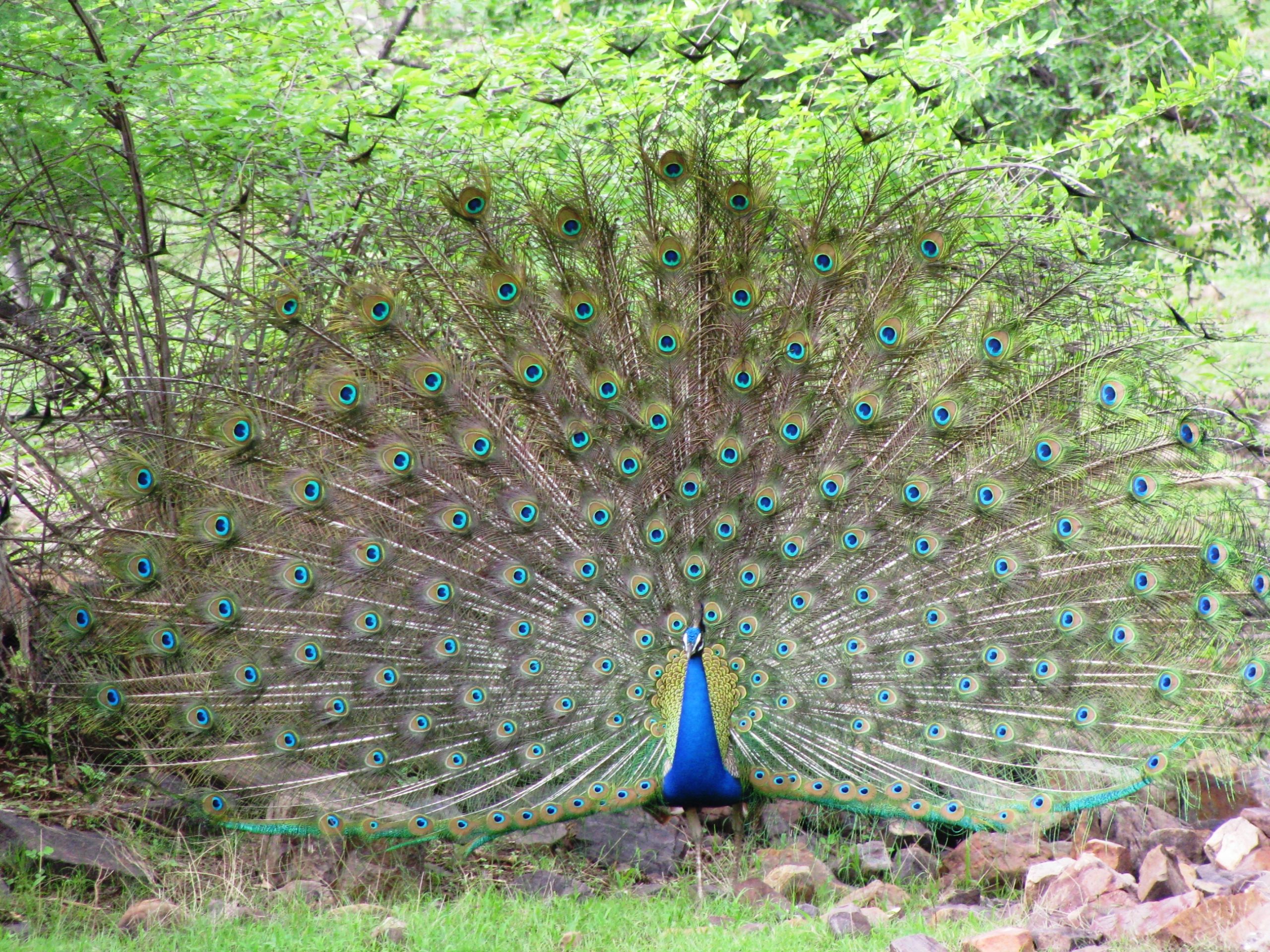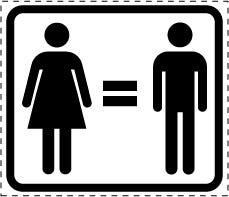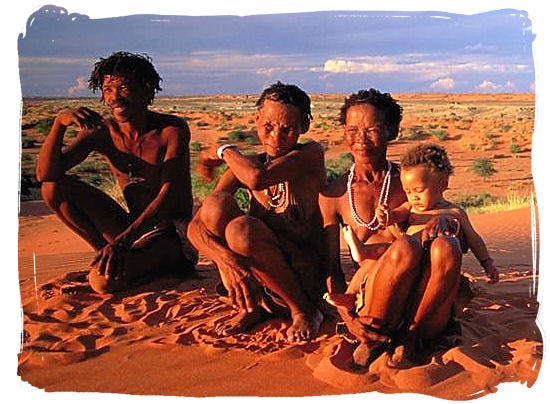
To human eyes, few things in the animal world come close to the splendor of a full-grown peacock in plumage. The iridescent blue and green of a peacock tail can leave even the driest and unpoetic of us spellbound. Such a magnificent fellow seems wasted on the thoroughly mediocre peahen. The peacock’s tail puzzled Charles Darwin, for he could not find any survival value in the flamboyant tail (rather the tail makes escaping predators much more difficult). The driver of this trait was not any direct survival value, but the seemingly partial treatment peacocks with fuller tails received from the peahens (some say the tail is a health indicator). They mated more often, sired more offspring and so their genes flowed and conquered the peacock gene pool, making peacocks with huge tails a norm.
In the 21st century, many evolutionary biologists state that with increasing health care, eradication of many contagious diseases, evolution via natural selection of homo sapiens is no longer shaping our future as a species as it did leading up to the 20th century (Or at least they did in the Pre COVID era ). For generations, preferences and desires of women have helped shape the alpha male- the knight in shining armor, whereas the preferences of men have led to the distinct female characteristics being present in most women. Oddly though, today overwhelmingly humans without means to meet even their basic needs are passing their genes to further generations (breeding like rabbits some call it). To compare humans to other animals may offer a specious argument today as we have left some of our evolutionary habits far behind, leading very different lives than our animal cousins. The Games of Sexes in humans have become incredibly nuanced which has complicated ramifications on every aspect of our society.
This courtship game has taken even weirder morph in the Indian subcontinent. In India, it’s not just the woman whom decides she mates with, but her parents, grandparents, her uncles, and aunts. Sexual selection has become a task for the entire society and feeling incredulous at this tendency is considered suspect. As we depend on middle-men in arranged marriages, single negative feedback from an otherwise unimportant person is enough to cast serious doubt in the proceedings. The growing feminism movement in the world has not yet had a substantial effect on the way marriages work in India. The society (Eg: western Maharashtra ) still dictates that an eligible bachelor

- Is halfway decent looking
- Earns over 5–15 lacs per annum & Earns at least marginally more than the girl (a lot of Indian mechanical engineers in the US – especially California are facing worse rating in the arranged marriage game as girls tend to take to Software and hence earn a lot more)
- Owns at least one house (or at least his parents own a Pucca house; The more the merrier — Preferably with low EMI)
- comes from a well to do family & own’s caste.
- has a Car (how did I forget about the CAR) (Make your own list #####)
Whereas an eligible spinster is:
- Good looking — Highly comparative
- Homely ? or Earning …….. (depends on who is looking)
- Sanskari – (even in families where their daughters are offered considerable freedom expectations from a daughter in law are stricter- though things are rapidly changing)
As one might note, society-created a criterion for eligibility of women are changing as feminism percolates slowly in our deeply patriarchal society. It’s more difficult to have a stereotype of the ideal spinster than that of her counterpart.
Many individuals (especially closeted homosexuals) are forced into an early and unhappy marriage especially when they’re the elder siblings. If and when homosexuality is accepted in our society, the change from that to the current rules of selection will be even more interesting. A flippant joke on the matter
Son: “Mother , I am going to marry Rajesh, I love him and now Gay marriage is legal in India too”.
Mother: “Naa beta … You cant marry him …”
Son : “Why ?”
Mother : “He isnt from our caste son. Find a gay from our caste.”

But ironically none of the above-stated qualities are essentially needed to pass on the genes as a Kalahari Bushmen would know. These qualities might make the individual a stable and bankable partner but they can’t be assumed as gospel blindly. The men today (even women to a growing extend today) spend their lives being overwhelmingly stressed to meet firstly the needs of their respective spouses in the future, their parents, and on a larger scale, their society. Exposure to such high levels of stress has resulted in low fertility (men and women)and erectile dysfunction in the millennials. One might even relate the above 5 eligibility points to have a linearly negative effect (above a certain threshold) on the overall physical state, thus hampering (re)-productivity. Is the battle for sex leading the individual away from sex?
India has not been the land of true innovation since the colonial experience like some of the western countries. We are good at jugaad and thus produce good engineers shy of true brilliance. Apart from the educational system and other “systems”, considerable blame can be put on the social system. An early marriage not only casts doubts on any aspirations a woman might have but also restrains the man from venturing further in his dreams. If the risk-taking scientist/ innovator is not assured of any respect from society, his task becomes doubly challenging. Not only is he expected to get married at 26–30 but he is also expected to prepare for it since 22. The problem is that families don’t choose risk-takers over boring / stable. Truly passionate people can take such rejections in their stride and move on. But when the whole societies fervently impose judgments and expectations on these to-be-innovators many of these innovators can bundle and pack-up. A man or woman above 30/-35 being single becomes a topic of gossip and doubts. Many times the clutches of sexual policing lead people to marriage where they would’ve otherwise stayed single whilst indulging in sex uninhibited. Deciding to spend your life with someone because you love them is one thing, doing it because you are lonely and needy is another. But being expected to marry someone because your family and society want it to happen is something totally different.
If we take away the societal pressure from the institution of marriage and keep the social networks of marriage active, individuals who wish to settle down will still get access to an efficient system to find mates while. But eccentric geniuses and renegades will not be forced to conform. Incidentally, that seems to be the place where Indian society appears to be heading IMO.
Post Script:
I am a supporter of a liberal Arranged Dating + Marriage which is picking up steam in Liberal India in the 21st century. I would love to see some research done on the stability of arranged marriages (the liberal Arranged Dating + Marriage ones – where individuals have a choice and veto) versus love marriages. I can see As I married quite early (in my peer group) at the age of 27, a lot of this argument might appear hypocritical.
Too many stereotypes in your article, Gaurav. And a superficial reading of selection theory.
In general, Hindu Dharma lays emphasis on early initiation into sexual and relationship rites. Everything else was centered around this. Modern research proves that people who have early or on-time sex in their young adulthood have greater cognitive and maturity traits in relationships. These traits prove very useful in navigating workplace and other life challenges. And the teens who have sex early on, exhibit less criminal behaviour, basically better social adjusted.
While perhaps, that freeing this early sexual release from the grip like vise of society could mean less pressure on adolescents, it doesn’t mean it will work like the way you imagine in your head. Sounds good, doesn’t work!! Example: Japan.
There is something to say about time tested methods which only now have started to reveal the secrets of their efficacy.
i see ur pt – i dont think i got my pt across well here on rereading !
Too many stereotypes in your article, Gaurav
yes I agree but stereotypes exist for a reason right- but as I note the views r largely anecdotal – inspired by struggles i see in people around me. Unable to decide anything about their careers owing to pressure of marriage game;
In general, Hindu Dharma lays emphasis on early initiation into sexual and relationship rites. Everything else was centered around this. Modern research proves that people who have early or on-time sex in their young adulthood have greater cognitive and maturity traits in relationships. These traits prove very useful in navigating workplace and other life challenges. And the teens who have sex early on, exhibit less criminal behaviour, basically better social adjusted.
I wasn’t necessarily against the trad methods – where people got settled early on had social safety net and hence could potentially be risky if conditions are good but current marriage game in India where I feel the expectations from grooms had become really unprecedented & unrealistic – (atleast in my peer circle).
In my recent comment I wrote about BAYA (the ancient derivative of Serbian BATA i.e. BRAT=brother) who is the #1 in our environments what includes various traits – a leader, street smart, handsome, humorous, brave, first in the battle, sexually attractive, heartthrob, etc. Just to remind on its other derivative, which is in English – BOY(=literally > battle) and on a comical situation that the meaning of ‘father’(pater, padre, etc) is actually – ‘brother’.
Anyway, in regard to this topic and based on limited information I have, how I imagine BAYA@BP?
It must be something as a half-way between the warlock and Yaggu, smart as Anan with APthk phenotype/passes and having VV’s hat (something as a mix of Belmondo/Dellon at their best)
who is Yaggu?
I found Shaadi.com to be a god-send. Before that my parents would take me to one house after another to meet a girl and the entirety of her family. Which did not suit me at all as I am somewhat introverted and it is really uncomfortable trying to make a connection in that setting. Plus they would look for girls which fit their idea of what a good wife would be and not my own preferences. Within five months of joining Shaadi.com, I had met my wife and we agreed to get married within one week. So far we have not had a single argument in the time we have known each other and I have never been happier. My brother in law has also just found a girl he really likes via the site and their respective parents are meeting this weekend.
The sooner the arranged marriage circus ends, the better for all concerned. You get much better outcomes from doing your own work, having a good idea of your own preferences, meeting in a one to one setting than trusting your parents, uncle, aunty etc. to find someone for you.
But wouldn’t u say Shadi.com is a bit of arranged as well?
a bit of arranged is a lot of bits Good than a Lot of arranged IMO
Exactly my experience; on online MH portal called Anuroop; there was parent involvement only at the final stage – rest everything can be managed by prospective grooms and brides